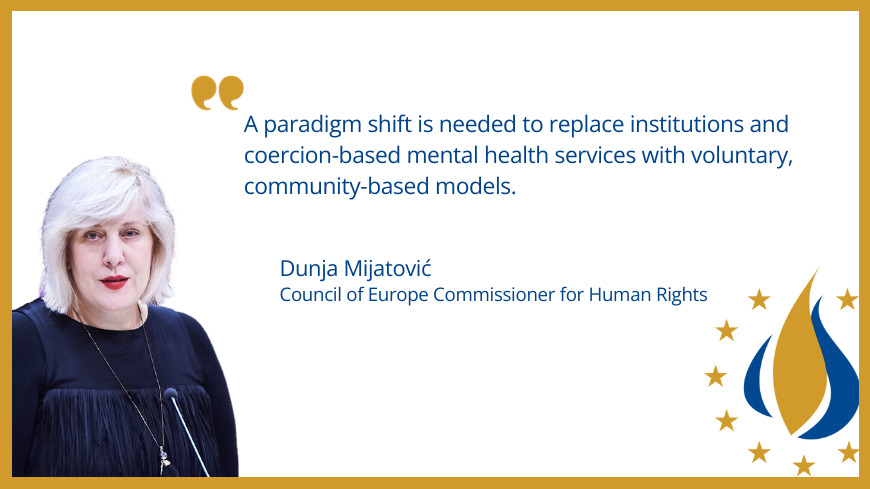Speech by the Council of Europe Commissioner for Human Rights, Dunja Mijatović at Riga Conference on promoting autonomy in mental healthcare (delivered via video)
Excellencies, distinguished participants,
Dear organisers, dear colleagues,
Thank you for your invitation to this important event. I am honoured to contribute to setting the scene to this much-needed debate on protecting the rights of persons in mental health care.
This has been a long-standing priority of my work and of the work of my predecessors – and the reason for this is that the human rights of persons with mental health problems or psychosocial disabilities continue to be violated in mental health settings.
Paternalism, institutionalisation and coercion are still widely present in mental health systems, reinforcing the historic stigmatisation, disempowerment and social exclusion of persons with mental health conditions and of other persons, notably those with psychosocial disabilities and impairments.
I have often raised these issues, including in an Issue Paper that I published in 2021, on “Protecting the right to health through inclusive and resilient health care for all”, and in my comments concerning the draft Additional Protocol to the Oviedo Convention.
Allow me to briefly summarise my observations.
There is a vicious circle of stigma, prejudice and coercion against persons with mental health issues. Mental health laws that normalise closed institutions and forced treatment confirm and reinforce prejudices according to which persons with mental health issues and persons with disabilities are dangerous to themselves and to society. However, as noted also in the Parliamentary Assembly’s report on ending coercion in mental health, studies suggest that the main cause of coercion is not the dangerousness of these persons or therapeutic necessity, but a prejudiced institutional culture and deeply rooted ableism.
My country work has also allowed me to observe that safeguards do little to prevent the excessive use of coercion in mental health settings. While laws define coercion as a measure of last resort, in reality, involuntary measures often become the default approach, especially where community-based services are lacking and where health services face the challenges of understaffing and prioritisation of resources.
The profound power asymmetry between the patient and physician in most mental health settings, laws which allow limitations of persons’ legal capacity, and the lack of access to justice for patients make it even more difficult to dismantle the ingrained practices of coercion and deprivation of liberty.
The way forward must be based on a human-rights approach to mental health care. As I stressed in my Human Rights Comment on the need to reform mental health systems, a paradigm shift is needed to replace institutions and coercion-based mental health services with voluntary, community-based models.
Some measures are vital in this respect, and I would like to mention the need to:
- Ensure the active participation of persons with lived experience of using mental health services in defining mental health policies. This is also an obligation under the UN Convention on the Rights of persons with Disabilities (CRPD);
- Ensure that mental health care is provided on the basis of free and informed consent – where necessary, with appropriate supports being provided for decision making;
- Ensure full access to justice to challenge decisions regarding involuntary placement or treatment, as long as these are a reality;
- Conduct reforms to ensure respect for the right to legal capacity and the right to live independently and be included in the community; and
- Take measures to deconstruct the entrenched stigma associated with mental health conditions and with all forms of disability.
Good practices exist in all these areas, and I have also documented several in my country and thematic work. I encourage member states and all of us to take inspiration from these positive examples.
I thank you again and wish you a constructive conference.



